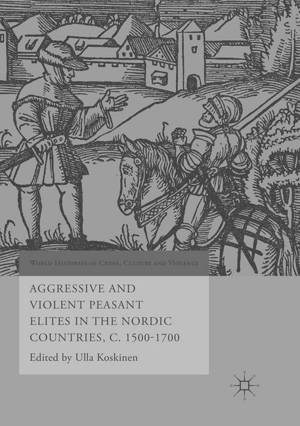
- Afhalen na 1 uur in een winkel met voorraad
- Gratis thuislevering in België vanaf € 30
- Ruim aanbod met 7 miljoen producten
- Afhalen na 1 uur in een winkel met voorraad
- Gratis thuislevering in België vanaf € 30
- Ruim aanbod met 7 miljoen producten
Zoeken
Aggressive and Violent Peasant Elites in the Nordic Countries, C. 1500-1700
€ 116,45
+ 232 punten
Omschrijving
This book investigates the forms that the aggression and violence of peasant elites could take in early modern Fennoscandia, and their role within society. The contributors highlight the social stratification, inner divisions, contradictions and conflicts of the peasant communities, but also pay attention to the elite as leaders of resistance against the authorities. With the formation of more centralised states, the elites' status and room for agency diminished, but regional and temporal variations were great in this relatively drawn-out process, and there still remained several favourable contexts for their agency. Even though the peasant elite was not a homogenous entity, the chapters in this collection present us one uniting feature - the peasant elites' tendency to assert themselves with an active and aggressive agency, even if this led to very different outcomes.
Specificaties
Betrokkenen
- Uitgeverij:
Inhoud
- Aantal bladzijden:
- 312
- Taal:
- Engels
- Reeks:
Eigenschappen
- Productcode (EAN):
- 9783319821559
- Verschijningsdatum:
- 12/07/2018
- Uitvoering:
- Paperback
- Formaat:
- Trade paperback (VS)
- Afmetingen:
- 148 mm x 210 mm
- Gewicht:
- 394 g

Alleen bij Standaard Boekhandel
+ 232 punten op je klantenkaart van Standaard Boekhandel
Beoordelingen
We publiceren alleen reviews die voldoen aan de voorwaarden voor reviews. Bekijk onze voorwaarden voor reviews.










